One-minute review
If you haven’t heard of Yeedi before, it’s because the brand was only launched in 2019. It only makes robot vacuums, and as such is able to put all its focus into perfecting this increasingly popular floor cleaning appliance. The brand’s aim is to provide robot vacuums with advanced technology, but at a price that’s not out of reach for most people.
The Yeedi Mop Station Pro is the top-of-the-range robot on offer from the brand, and as such is also its most expensive. But at under $600 for a robot vacuum that has some of the most sophisticated mopping features we’ve seen, it’s not a bad deal.
Many of the best robot vacuums (opens in new tab) that also claim to mop simply drag a moistened microfiber cloth over your floors – and in use the cloth becomes clogged and dirty, so less effective. The Yeedi Mop Station Pro is different. Its charging dock doubles as a self-cleaning station, and when it’s in mopping mode the robot returns to the station every 10 minutes to have its two rotating mopping pads cleaned. And with two large tanks housed inside the station, it’s quite self-sufficient.
On test the vacuum was effective at collecting debris, and the mop is good for cleaning grubby floors. But it won’t scrub away tougher dried-on residues, nor does it mop right up to the baseboards. It’s best suited to use on a single floor, since the app can’t map multiple floor plans, and you’ll need space for the bulky docking station.
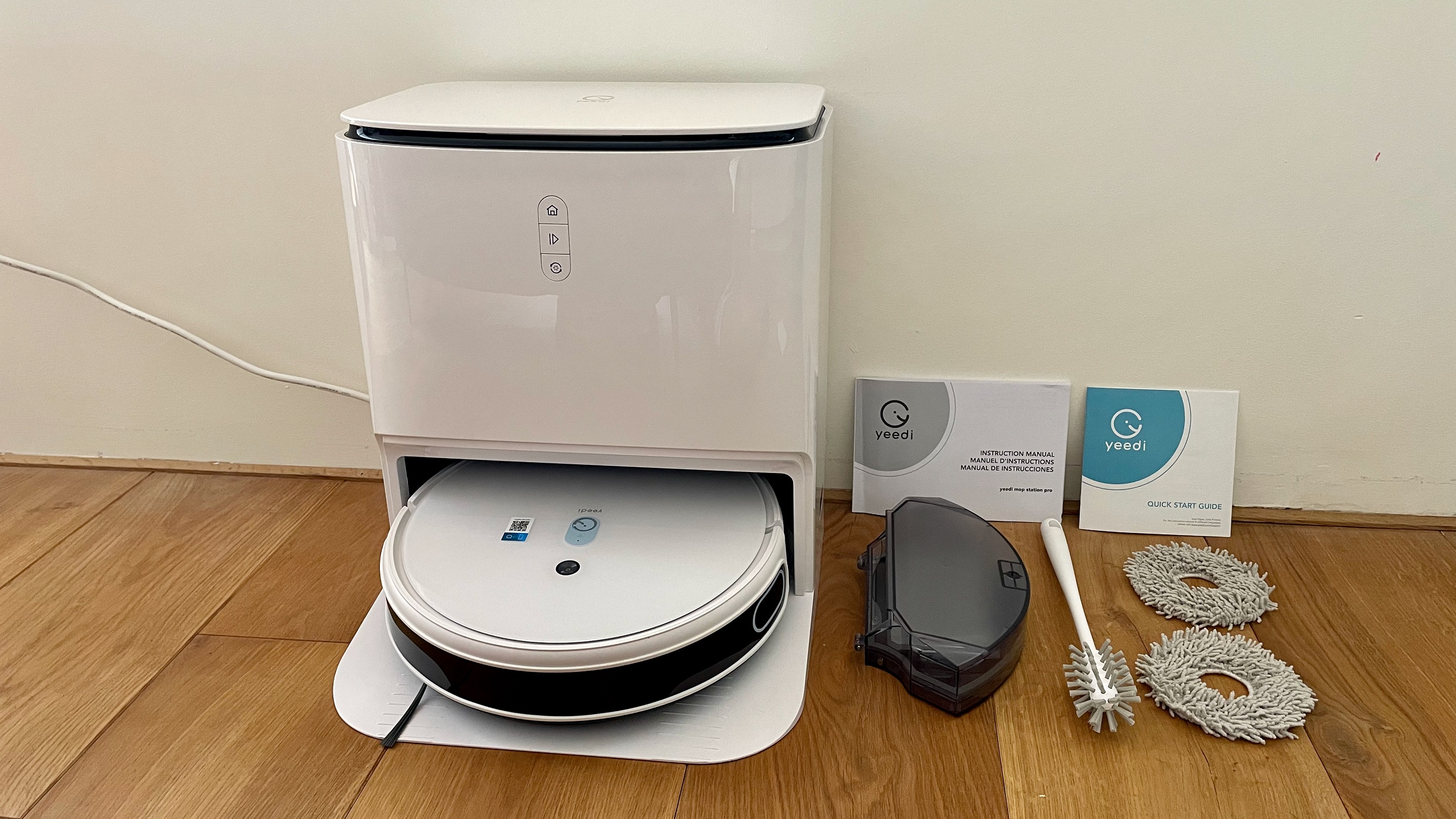
Yeedi Mop Station Pro price and availability
At present the Yeedi Mop Station Pro is only available in the US, where it’s available directly through Yeedi (opens in new tab) or on Amazon. It’s the brand’s only robot vacuum with integrated mopping, and is the most expensive of its range of floor-cleaning robots.
- Price and availability score: 4 / 5
Design
- 26fl oz / 750ml dustbin
- 6.2-pint / 3.5-liter clean and dirty water tanks
- 2 spare mop pads included
The Yeedi robot itself is a pretty standard size for a robot vacuum. The charging station is pretty big, but with two 26fl oz / 3.5-liter tanks – one for clean water and one for dirty water – housed inside, it’s easy to see why it’s so bulky. The whole thing measures 17 x 15 x 16 inches / 43 x 38 x 40.5cm (h x w x d), and it needs to be placed in an area with plenty of clearance on either side as well as in front, so that the robot can navigate its way back with ease.
The two tanks are easily removable, and have sturdy carry handles and latched lids for quick and easy filling and emptying. The robot itself comes with two interchangeable dustbins, one for vacuuming only and the other for vacuuming and mopping. The two round rotating mop heads attach by magnet to the underside of the mopping dustbin, and you also get a second set of mop heads and a brush for cleaning the water containers and docking station.
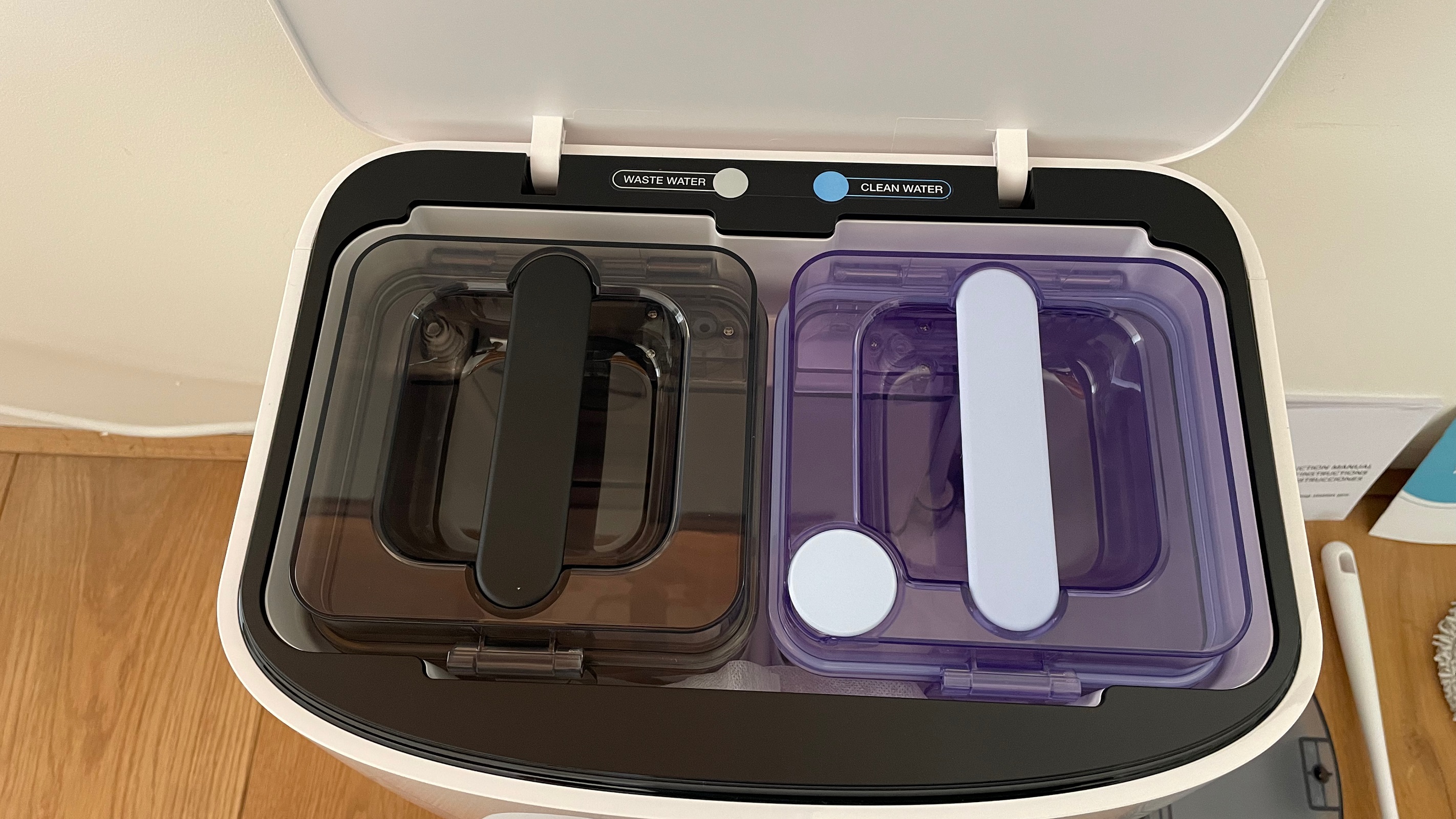
You can start the robot cleaner using the button on top, and there are also buttons on the dock that allow you to start, recall or begin a self-clean. Most of the Mop Station Pro’s functionality, such as suction settings, virtual barriers and scheduled cleaning is accessed via the app, which we’ll discuss in more detail below.
It’s easy to get the robot set up and running, and other than attaching the mop pads and filling the water tank, there’s no assembly required. There’s no mention in the manual about whether or not you can add detergent to the clean water tank; however, we noticed that Yeedi answered a customer question about this on Amazon, saying “You can use weak alkaline low-foaming cleaning solution.”
This isn’t a robot that empties its own bin, so you’ll need to empty this regularly, along with cleaning the filters and making sure the cleaning brushes are free of hair and debris. Emptying the dirty water tank after each mopping session is vital if you want to prevent odors from forming, and you’ll also need to keep an eye on the state of the mop pads – Yeedi recommends that you replace them every three months.
The manual advises that rooms should be well lit during cleaning to help the robot navigate its way round, which isn’t very convenient if you want the robot to clean rooms overnight.
Performance
- Low noise levels
- Avoids toppling down stairs
- Good choice of suction levels
When vacuuming, the Yeedi Mop Station Pro appeared to be taking a fairly methodical approach to the space, though it was definitely more random than other robot vacuums we’ve reviewed. When we spilled flour on our hard floors, the vacuum collected most of it, but it also pushed a small amount into the grooves between the wood floor planks.
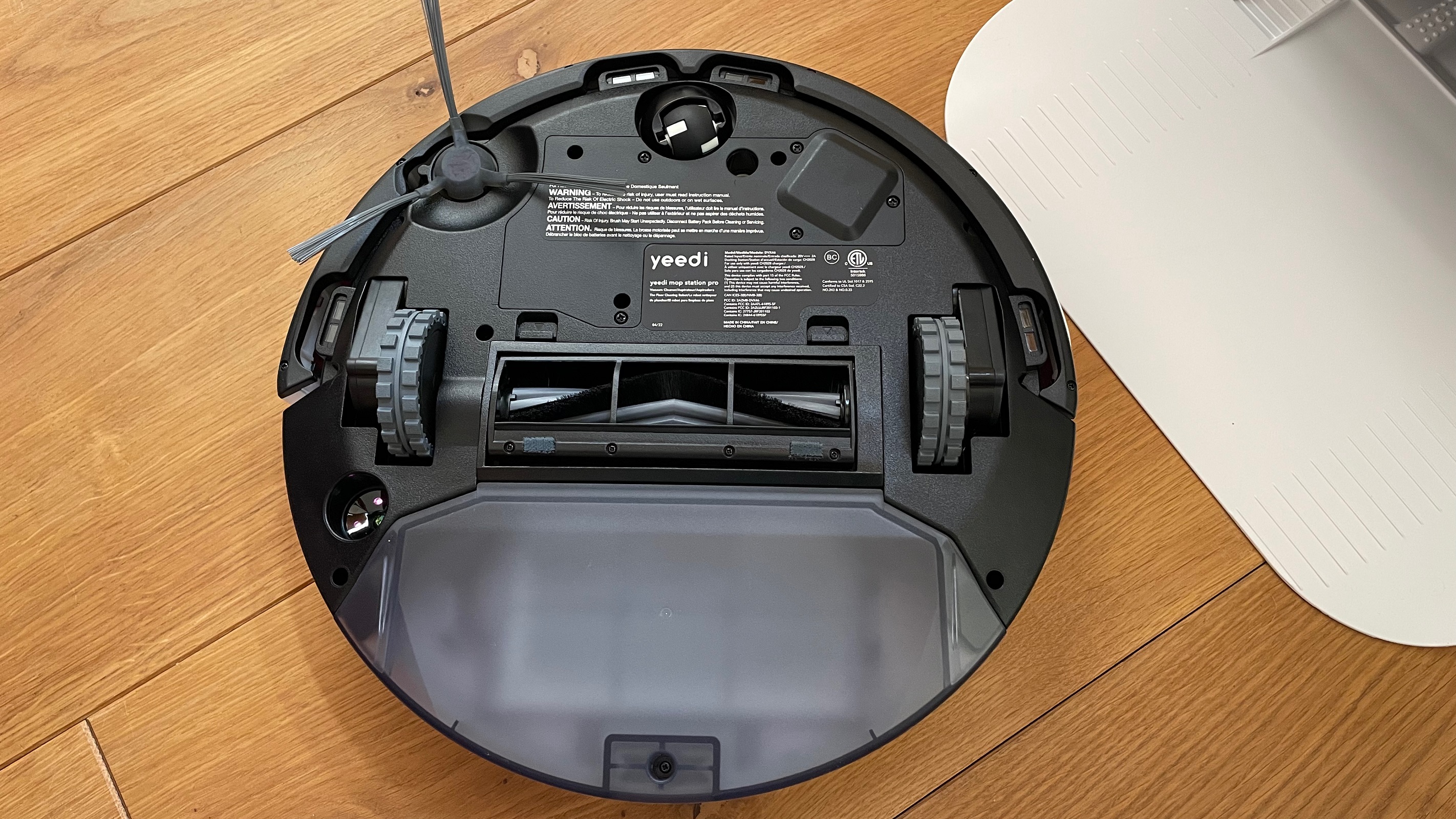
We spilled oats in three separate areas, and it sucked up 100% of one spillage, but only about 75% of another, flicking some of the oats around the floor. Of the oats that we dropped onto a deep pile rug, it managed to collect around 50%, leaving the rest embedded in the pile.
At times the robot transitioned smoothly between a hard floor and a thick pile rug, whereas on other occasions it would reach the rug and turn around, apparently deciding that it was too much of a step up. General carpet cleaning is best done on the higher suction level.
Emptying the bin is simple, but we did notice that hair quickly became tangled around the brush roller, and this needs to be cut off. In terms of noise, it’s pretty quiet, registering 55dB on quiet mode, rising to 58dB on standard power, 65dB on max power, and 70dB on max plus, which is about the same noise level as a typical vacuum or a washing machine.
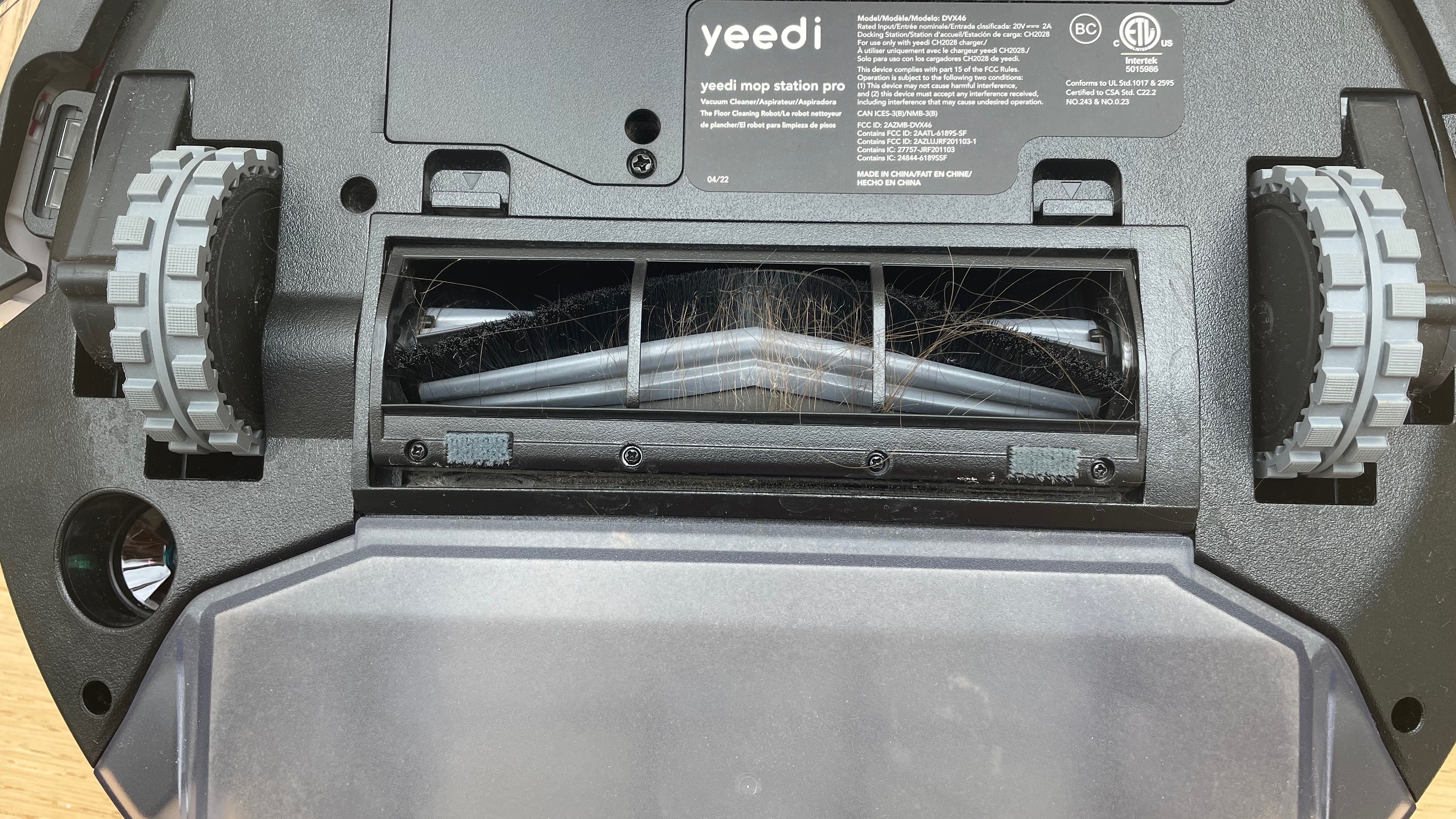
During mopping the Mop Station Pro avoided going onto our area rug or into a carpeted room, as it’s designed to do, but there were occasions when the mop would brush over a corner or along an edge of the carpet or rug, so it’s worth drawing a boundary around such areas in the app to be sure it’ll avoid them altogether.
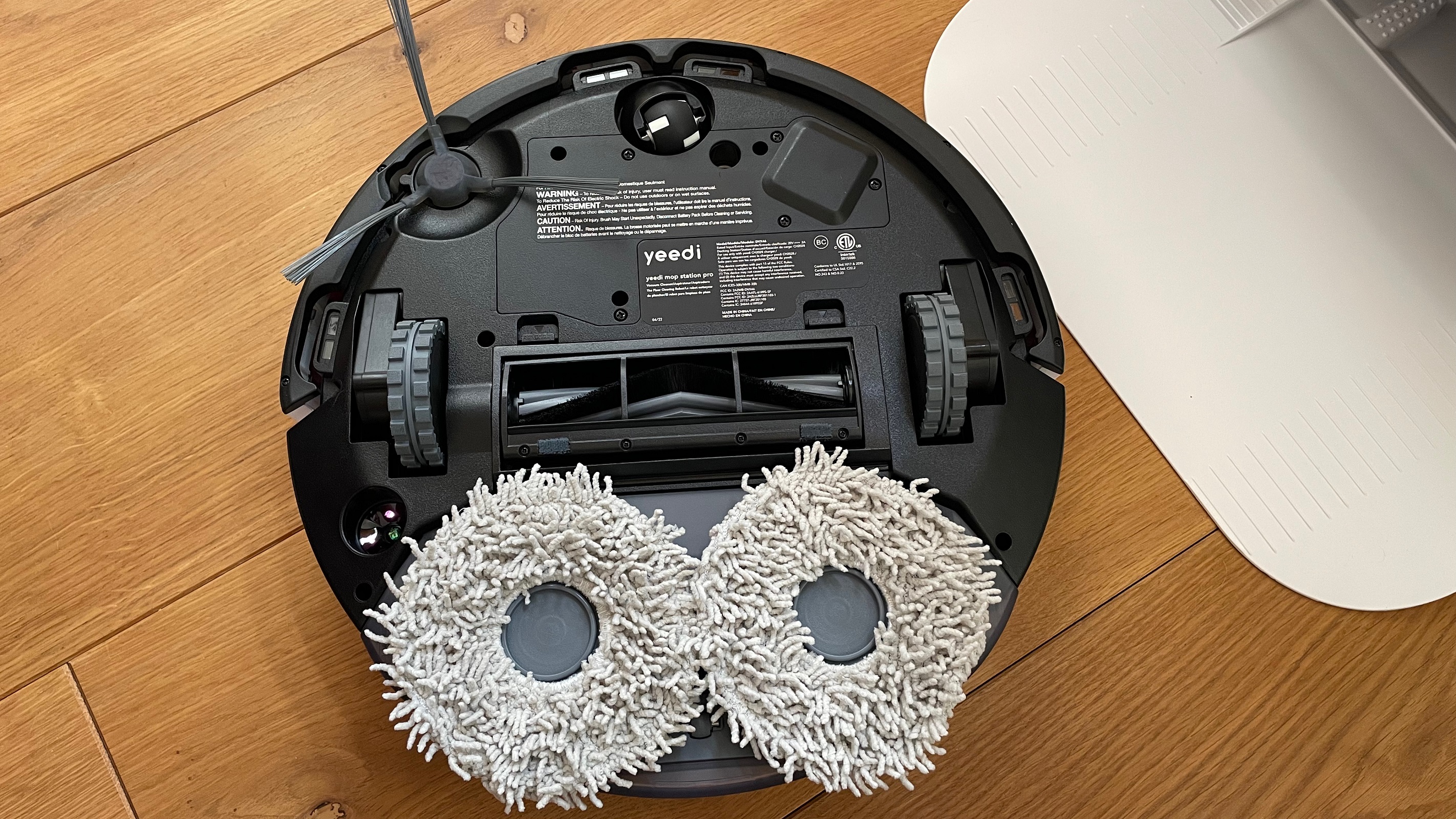
We think this cleaner is best for light, regular mopping, and giving floors a daily spruce up. When we allowed a few dollops of ketchup to dry on the floor overnight, it struggled to remove them even after two runs, and the mop heads don’t reach right to the edges of the room, leaving a border of around 2.5 inches / 6.5cm along baseboards that doesn’t get cleaned. That said, it was surprisingly effective at cleaning an uneven slate floor, mopping into the undulations better than we expected, although as with most electric mops it didn’t clean the grout.
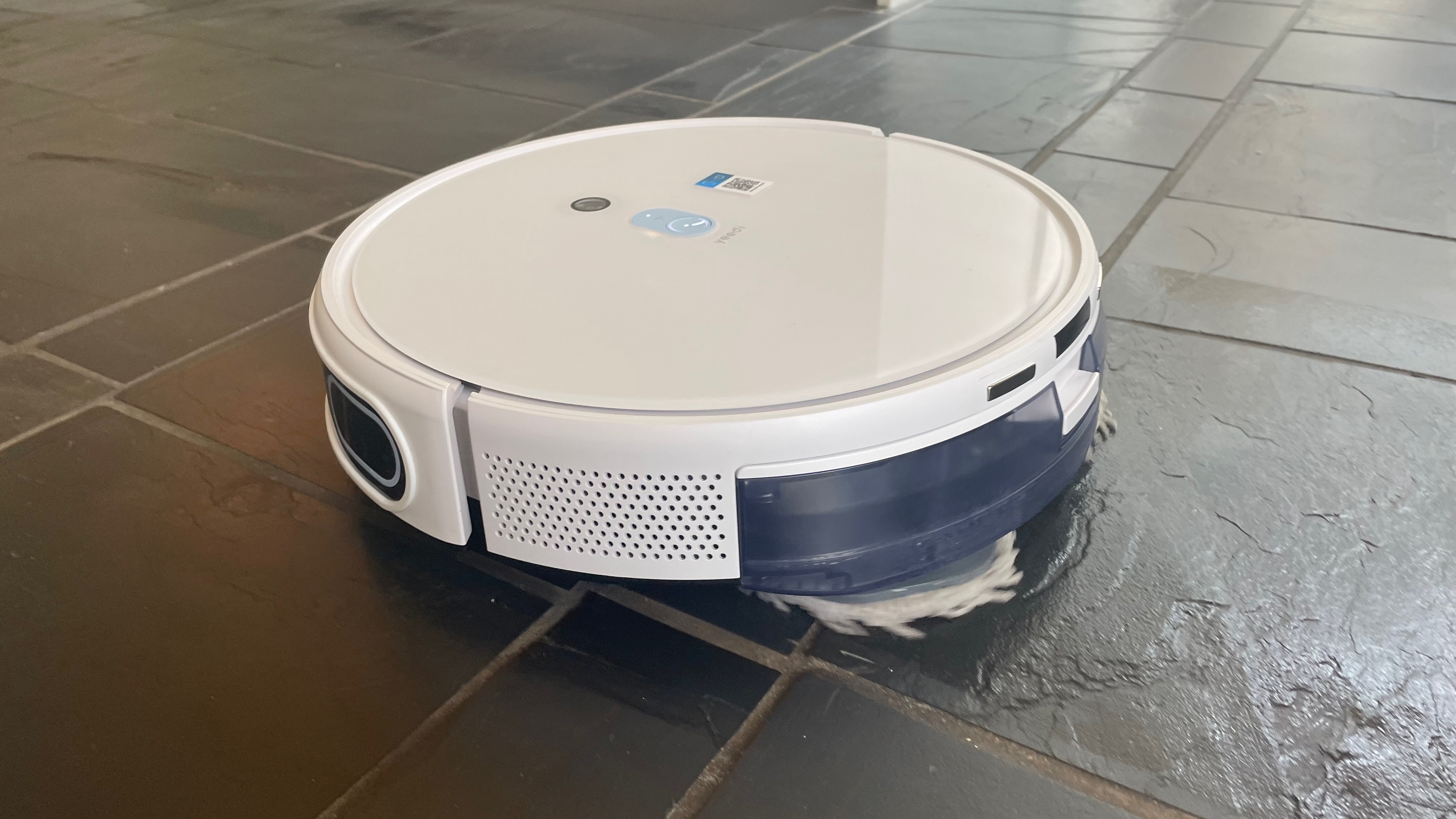
During mopping, the Mop Station Pro returns to the docking station every 10 minutes to have the mop pads cleaned and the on-board water tank refilled. It’s a process that takes about 1 minute 20 seconds, after which the robot sets off to continue mopping where it left off. The issue here is that if you want to mop a room like an upstairs bathroom that’s not within reach of the downstairs docking station, the robot will only mop for 10 minutes, then start to look for the docking station that’s not there. Eventually it’ll switch off and alert you that it’s lost, but it may not have completed the clean.
Mopping is quiet at around 60dB, and changing the water flow level makes little difference to the noise level. The noisiest part of the operation is at the start of mopping, when water is transferred from the main tank to the robot, with noise levels reaching 68dB.
When it’s finished mopping the robot returns to the station for the mopping pads to be cleaned, and starts a process of air-drying the mop heads, which takes around six hours. At this stage it’s important to empty the dirty water bucket, as failing to do this could lead to odors building up.
During drying there’s a low hum from the fan as it blows air at the mop heads. We left the Mop Station Pro to complete the drying overnight, but in the morning noticed the pads were still a little damp, which is something to keep an eye on if you want to avoid smelly mops. Dirt and debris also builds up in the floor of the docking area where the mops get cleaned, so this will need a regular wipe to keep it clean.
App
- Intuitive to use
- Sends you alerts if the robot gets stuck
- Can only store one map
Connecting the robot to our Wi-Fi and configuring the app was a quick and simple process – the app guides you step-by-step so you really can’t go wrong.
During its first clean, the robot creates a map of your floor plan, and once this is complete you’re able to configure the various options and settings. These include selecting one of the four vacuum power levels, or one of three water flow levels when mopping.
The app also allows you to create virtual boundaries on maps, and set these to apply to either mopping only or both vacuuming and mopping. What’s more, the custom clean option allows you to draw an area on the map and send the robot to clean just this specific area, though the level of map detail makes it hard to be particularly precise when doing this.
There’s a ‘do not disturb’ option which you can engage to ensure the robot doesn’t clean during your specified window. And as we’ve come to expect from all robot vacuums, you can schedule cleaning for specific times and days with an easy-to-use scheduling tool.
Unfortunately, the current version of the app can’t store multiple maps, which means the robot can only be used effectively on one floor of your home. And if your floors include any level changes, such as small steps between rooms, the use is restricted further.
Battery life
- Returns to charger when battery gets low
- Claimed 180-minute runtime
- Resumes cleaning job once recharged
When vacuuming on max power for 80 mins the Yeedi Mop Station Pro used 50% of its battery, which is the equivalent of a 160-minute total runtime – that’s not bad, given that it was on the second highest suction level. Even better, it had vacuumed for almost 120 minutes on standard suction when the battery level reached 50% – that equates to a 240-minute run time, which far exceeds the 180 minutes stated by Yeedi. As you’d expect, mopping drains the battery faster than vacuuming, with a 70-minute mopping session using 50% of the battery.
The robot returns to the charger to recharge when the battery level reaches 15%, so you actually don’t benefit from the full available runtime that you would get if it returned when the battery was at almost 0%. A full recharge back to 100% took approximately four hours and 25 minutes.
It’s worth noting that the time it took to clean the same space wasn’t consistent, with the robot taking anywhere between 27 and 50 minutes to vacuum our living room. So the amount of floorspace it can clean before needing a recharge will vary.
| Attributes | Notes | Rating |
|---|---|---|
| Price & affordability | Competitively priced given all the features on offer, but only available in the US | 4/5 |
| Design | Simple design and good self-clean mopping system, but the bin isn’t self-emptying, and you can’t use the robot in the dark. | 4/5 |
| Performance | Good for general daily vacuuming and mopping, but doesn’t eliminate the need for manual mopping altogether | 4/5 |
| App | Simple to use, with most of the features you need, but lacks the ability to map more than one floor. | 4/5 |
| Battery | The battery runtime is good, the robot returns to the charger when low and the recharge time isn’t too lengthy. | 5/5 |
Buy it if…
Don’t buy it if…
- First reviewed: August 2022



